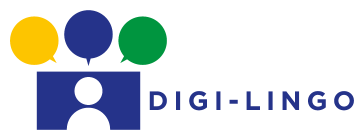What we do
Digi-Lingo is a transnational co-operative rooted in a cross-regional European partnership consisting of five different partners. Our goal is to develop and support new and innovative teaching methods and programs within a digital format through a democratic, open and cross-cultural process. We work towards broadening digital awareness in the language-learning progress, and via this hope to enhance the European youth's foreign language skills.
Language is cultivation
The European community is both historically and in the present-day based on cultural, monetary and ideological exchange. One of the most central conditions for exchange is language; as through language we are not only able to communicate, but also reflect on, innovate and understand new ideas across an endless array of apparent boundaries.
To have strong foreign language competencies is vital in this globalised and fast-paced society, where the world is getting even smaller and even more connected by the minute. Cross-cultural meetings have in this light become the norm rather than the exception, and teaching in foreign languages are thus more relevant than ever.
It takes strong international relationships to continuously evolve and develop such teachings in an everchanging world, and our aim with Digi-Lingo is exactly to cultivate educational methods through joint partnerships across borders. We do this because we believe that the acquisition of new language skills is eventually a key factor in securing the open and democratic sense of 'Europeannes', that serves as the foundation for much of our shared identity.
Multilingualism and digitization
In the light of this, the European Union has a stated goal of 'multilingualism'. That is, they strive for everyone to be able to speak at least two foreign languages beside one's mother tongue.
This ambitious goal makes the teaching of foreign languages even more relevant. Nonetheless, language teaching is ever evolving, and teaching should therefore continuously be adaptable and open to new challenges to remain relevant in a world increasingly dominated by fewer languages.
Technology and digital tools have revolutionized many other parts of the educational sector. This was for many rapidly forced through due to the lockdowns during the COVID-19 pandemic, yet not only with inconvenience to follow. It forced teachers to adapt and evolve in their approach, which sometimes resulted in improvements and innovative new ways to traditional teaching methods. The COVID-19 lockdowns have thus been a foundation and an eye-opener for using digital methods in the traditional teaching, besides all the didactic and social challenges it carried with it. Digi-Lingo is then a solution-oriented response to the interplay between the huge potentials of and many challenges tied to digital teaching.
The goal of Digi-Lingo
Our goal in this regard is to connect the latent importance of language-learning with the huge potentials of the digital world. We want to develop new and innovative methods for teaching languages, and carry the broader educational field into a new teaching reality.
Our stated objectives are therefore:
- to develop new teaching guidelines for digital language learning
- to develop easily accessible methods for virtual language exchange
- to establish a sustainable organisational model anchored at the regional level.
The project is focused on the upper-secondary level, but should in time be applicable for the broader scale of language education in the whole European Union.
We are as stated a transnationally rooted regional partnership with partners from Denmark, Norway, Belgium and The Basque Country, and we therefore have first-hand experience with the relevance of digital methods as a means of cultural exchange through our daily work.
